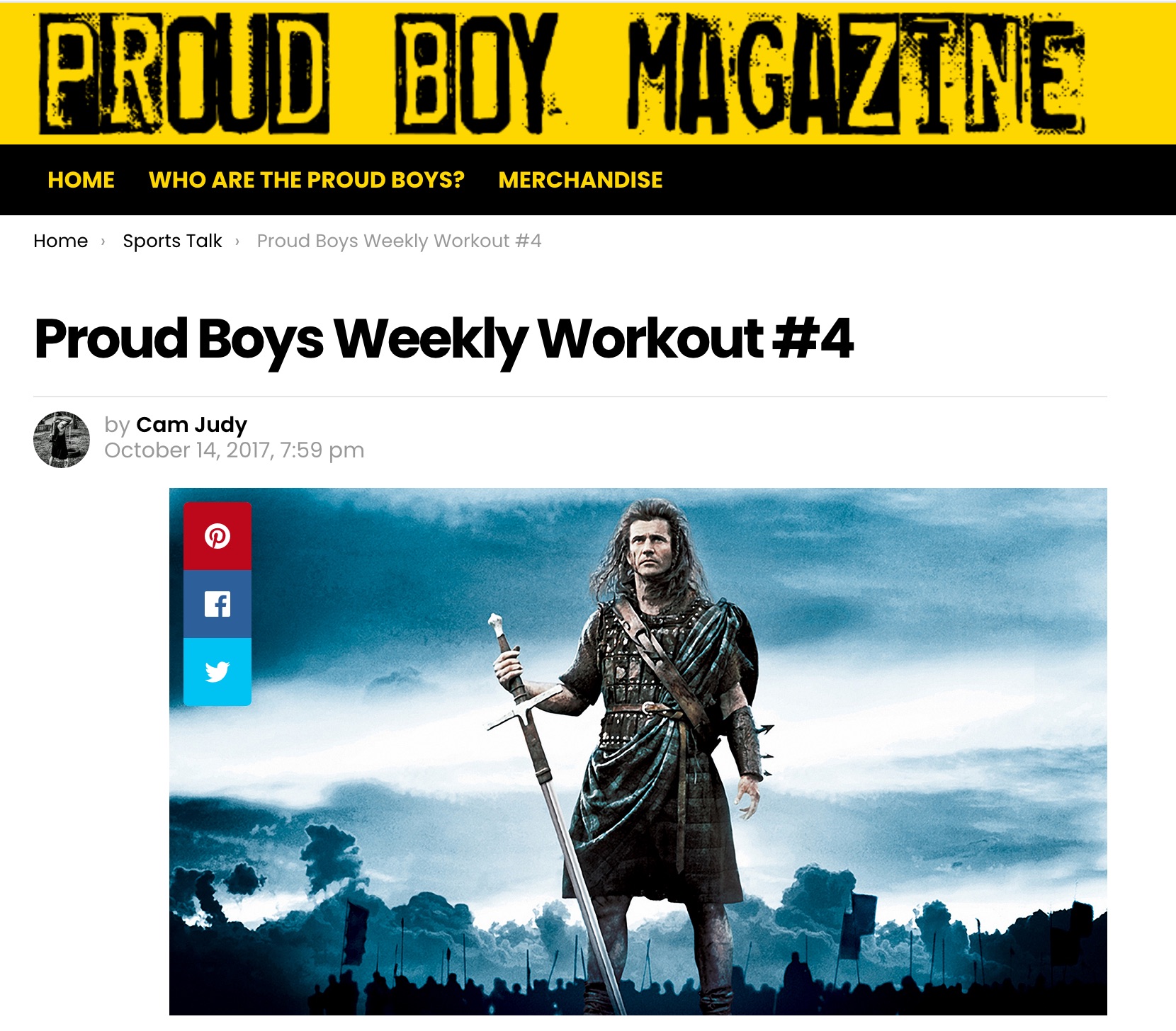The Proud Boys and Greco-Roman Masculinity

During the first debate of the 2020 U.S. Presidential campaign, President Trump was asked to condemn white supremacy. Instead he said “Proud Boys, Stand Back and Stand By…somebody’s got to do something about antifa and the left.” Trump’s expression of support for a white supremacist and anti-Semitic organization that promotes and engages in violence is just the latest evidence of the white supremacy in the Trump administration. A former neo-Nazi recognized this as “clear encouragment for continued violence,” coming from an administration that has attempted to downplay the threat of white supremacy in America. It is to be hoped that such a high-profile shout-out to a racist organization will call (further) attention to these facts and to the true nature of The Proud Boys, whose founder claims the group’s focus is not race but “Western Values.” And indeed, the group’s website describes them as “Western Chauvinists” who “refuse to apologize for creating the modern world.” The Proud Boys are thus yet another organization that attempts to conceal its racism behind arguments about the supposed superiority of “Western Civilization.” And wherever such claims are made, Greco-Roman antiquity usually comes up as well. The articles in “Proud Boy Magazine” are no exception.

The Proud Boys is an all-male organization and, like many misogynists Pharos has documented, much of their interest in antiquity revolves around identifying ancient models for masculinity. If kettlebells have their origin in ancient Greece, as one article claims, this means (the implicit argument goes) that they represent a superior form of physical training. Thus they exhort each other to lift weights by citing Socrates’ argument in Xenophon’s Memorabilia that men must pursue physical training, and cite the mythological figures Hercules and Theseus as stories that illustrate how “strength has been a human obsession since the dawn of time.” The Proud Boys are all about what’s “traditional,” whether that means “venerating the housewife” (one of their “tenets”), defending Confederate monuments, or indulging in the white supremacist obsession with the “weakness and decay” of modernity.
Admiration for Sparta is common among white supremacists, including the Proud Boys. An article describing how “throwing a punch is an essential skill along your journey to manhood” takes inspiration from ancient Sparta, which it describes as “our ultimate example of a warrior society.” The article praises Sparta because “around the age of 7, Spartan boys were sent to the Agoge to learn how to fight” and because citizenship was denied to anyone who failed in that training. It sounds like a state-sponsored program of acculturation into toxic masculinity, but for the Proud Boys it’s evidence that their vision of violent masculinity is not only “traditional” but fundamental to a properly functioning society. It is easy to see the Proud Boys’ emphasis on physical fitness and fighting skills as nothing more than preening and posturing, but it is of a piece with white supremacist fascination with ancient violence, whether Spartan, Roman, or Homeric. The Proud Boys’ own history of violent action shows their admiration for Sparta’s warrior ethos is not just symbolic.
Violent ideals of masculinity that are grounded in admiration for antiquity provide part of the foundation of the ideology of some of Trump’s most dangerous supporters
F0r the Proud Boys, antiquity provides models not just for individuals but also for large-scale violence. For example, the Proud Boys published a piece defending Christopher Columbus against indigenous critics of his holiday. The piece argues that “if you are quaking with fear and anger at the very sound of the name of a historical figure that died 500 years ago,” you need “medication.” The author says it is no more “rational” to feel angry about Columbus than about famous ancient imperialists like Julius Caesar or Cyrus the Great. The article ignores that anger about Columbus derives not just from his crimes but from the fact that he continues to be regarded and publicly celebrated as an important and admirable figure. And although Julius Caesar and Cyrus the Great don’t get national holidays, the violence they perpetrated is similarly elided and condoned. High School Latin students are introduced to Caesar’s campaign in Gaul in a textbook called “A Call to Conquest” and Cyrus, like Alexander of Macedon, is routinely called “The Great.”
Invocations of violence from ancient history are intended to make more recent — or present day — violence legitimate, because ancient “empires” tend to be admired rather than recognized as imperialist war machines. Following violent clashes between Proud Boys and counter-protestors in Washington D.C. in December, 2020, the Anti-Defamation League published a photograph (above) of a Proud Boy wearing a T-shirt with the slogan “6MWE” and an eagle and fasces, a popular symbol of the Roman Empire. “6MWE” is an Anti-Semitic acronym meaning “Six Million Weren’t Enough,” a patent call for the genocide of Jewish people combined on this shirt with a symbol of Roman imperial power. This particular version of the Roman fasces was chosen for this shirt because it combines Roman and Nazi imagery: it is the same version of the fasces used by the Nazi puppet state established in Italy toward the end of World War II. The laurel wreath in the background of the shirt is another symbol associated in ancient Rome with military triumph, which has itself become a common symbol on Proud Boys paraphernalia. (Thanks to Corey Brennan for the analysis of the specific version of the Roman fasces.)
The Trump administration and its supporters have only occasionally invoked Classical antiquity in support of its racism. It’s not their “go-to” point of reference. Antiquity is not one of the Proud Boy’s primary reference points either, although they do locate the origin of the “Maximum Freedom” they supposedly promote in the “Greco-Roman tradition of the [American] Republic.” But as Trump appears to be laying the groundwork to undermine the electoral process in November, his request that the Proud Boys “stand by” points to how violent ideals of masculinity that are grounded in admiration for antiquity provide part of the foundation of the ideology of some of his most extreme, and dangerous, supporters.
What to do now: make sure you are registered to vote and know how to cast your ballot (if it is possible to do so in person, whether on election day or through early voting, do that because absentee ballots are easier to contest).
What to learn now: Choosedemocracy.us has compiled a list of how you can prepare to resist an attempted coup in November, including historical case-studies about how swift, mass action provides the best chance of defeating any attempt to subvert election results.
